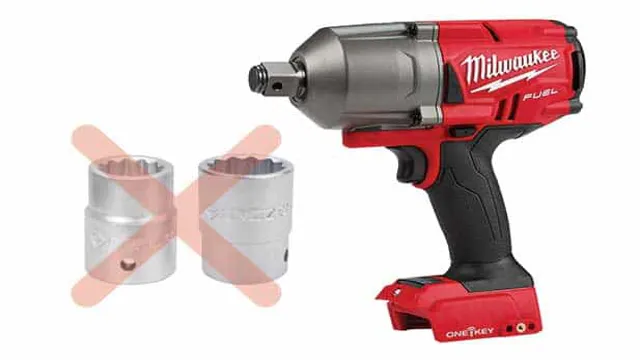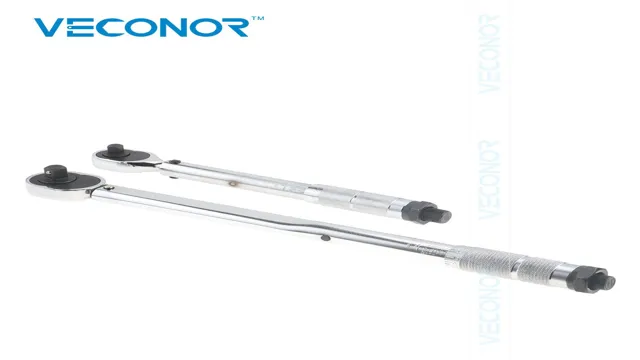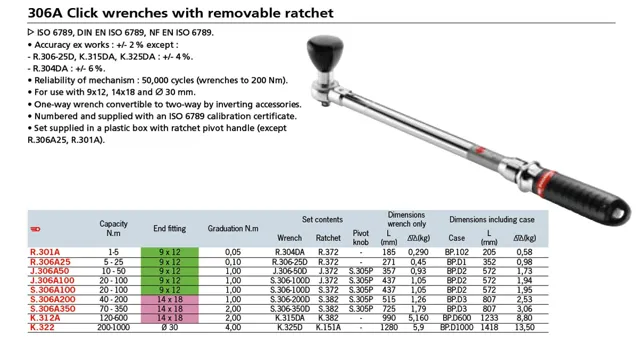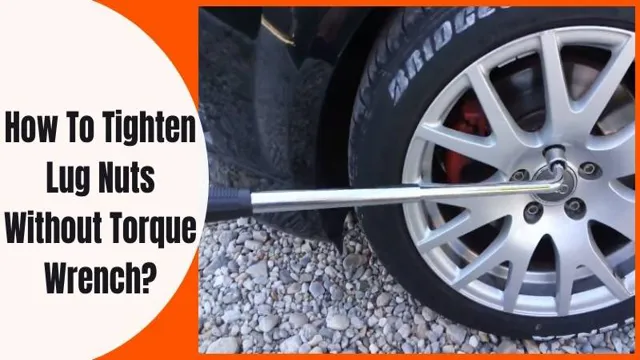Can You Use Impact Sockets with a Torque Wrench? Experts Share Must-Know Tips

Have you ever been in a situation where you needed to tighten a bolt but didn’t have the right tools? Or maybe you had the tools, but you weren’t sure how to properly use them? When it comes to tightening bolts and nuts, using the right tools and techniques is crucial. One common way to ensure proper tightening is to use a torque wrench, but did you know that using impact sockets with a torque wrench can make the task even easier and more effective? Impact sockets are designed to withstand high torque and are commonly used with impact wrenches. However, they can also be used with torque wrenches to achieve accurate and consistent tightening.
When used together, impact sockets and torque wrenches can make quick work of even the toughest bolts. Plus, impact sockets are less likely to round off bolt heads than standard sockets. Using impact sockets with a torque wrench requires a bit of knowledge and care.
It’s important to use the right size and type of socket for the job, and to ensure that the socket is properly seated on the bolt or nut. In addition, it’s crucial to calibrate the torque wrench for the specific application and to use it correctly. In this blog, we’ll take a closer look at the benefits and potential pitfalls of using impact sockets with a torque wrench, and provide some practical tips for doing so effectively.
So, let’s get wrenching!
What are Impact Sockets?
Impact sockets are heavy-duty sockets made with a thicker and tougher material than regular sockets. These specialized sockets are designed to withstand the high torque created by impact wrenches, which are used in heavy-duty applications such as construction and automotive repair. However, the question remains: can you use impact sockets with a torque wrench? The answer is yes, you can use impact sockets with a torque wrench, but it’s essential to keep in mind that torque wrenches are intended for precision applications, while impact tools are meant for higher power.
Impact sockets may also be marked as having a different torque rating than a torque wrench can handle, so always refer to the manufacturer’s guidelines before using them together. By using impact sockets with a torque wrench, you can achieve accurate torque as well as increase the durability and lifespan of both tools.
Function and Design of Impact Sockets
Impact sockets are specially designed to handle the high torque and force generated by impact wrenches. Unlike regular sockets, which may crack or break under such pressure, impact sockets are made from stronger materials (usually chrome-molybdenum steel) that can withstand the extreme stress. They also have a distinctive black oxide finish that increases their resistance to rust and corrosion.
Moreover, impact sockets have a thicker wall and a deeper well than standard sockets, which allows them to grip the fastener more securely and evenly distribute the pressure. This prevents any slippage or rounding off of the bolt or nut, which can cause damage to the tool and the application. In essence, impact sockets are a crucial component of any mechanic’s toolkit, offering both functionality and durability.

Materials Used for Impact Sockets
Impact sockets are specialized tools used to apply torque to fasteners during mechanical applications. These sockets are designed to withstand the high-impact forces produced by impact drivers, making them an essential part of any mechanic’s toolkit. Various materials are used in the manufacture of impact sockets, each offering unique benefits.
Most commonly, chrome-molybdenum steel is used, owing to its high tensile strength and resistance to wear and tear. Other materials, such as chrome-vanadium steel and black oxide steel, are also used for their durability and toughness. Regardless of the material used, impact sockets are designed to provide a solid grip and prevent slippage during use, making them a must-have for any mechanic or DIY enthusiast.
What is a Torque Wrench?
When it comes to using impact sockets with a torque wrench, the short answer is yes, it is possible. However, there are some things to keep in mind before doing so. Impact sockets are designed to withstand the high torque produced by impact wrenches, while torque wrenches are designed to measure and control the amount of torque applied to a fastener.
Therefore, using impact sockets with a torque wrench may not provide accurate readings and may even damage the torque wrench itself over time. It’s also worth noting that some torque wrench manufacturers may advise against using impact sockets with their products. To ensure accurate readings and prevent any potential damage, it’s recommended to use standard, non-impact sockets with torque wrenches.
How Torque Wrenches Work
A torque wrench is a specialized tool used to measure and apply a specific amount of force, or torque, to a fastener, such as a bolt or nut. It is an essential tool for anyone working on mechanical equipment or vehicles. Torque wrenches come in various shapes and sizes, and they all operate on the same principle.
When the wrench is tightened, it exerts a specific force on the fastener, which produces a tightening or loosening effect. This force is measured in foot-pounds or newton-meters and can be adjusted to a precise value on the wrench. A torque wrench ensures that fasteners are tightened to the correct specification, preventing them from coming loose, breaking or damaging the equipment.
So, if you want to ensure the perfect application of force on fasteners, a torque wrench is an indispensable tool to have in your toolkit!
Types of Torque Wrenches
A torque wrench is a specialized tool used for tightening bolts and nuts accurately to a specific torque value. This ensures that the bolts are tightened to the manufacturer’s recommended specifications, which is essential for safely and securely assembling parts of machinery, automobiles, and other equipment. There are multiple types of torque wrenches available in the market, including beam-style, click-style, digital, and hydraulic wrenches.
Each of these tools has varying levels of accuracy, ease of use, and price point. Beam-style torque wrenches have a simple design and are the most affordable, whereas digital wrenches are more accurate and often come with additional features like data recording. Hydraulic wrenches are the most expensive but are ideal for applications where high levels of torque are required.
The type of torque wrench to use ultimately depends on the specific application and budget.
Calibrating and Using a Torque Wrench
A torque wrench is a specialized tool that is used to tighten bolts and nuts to a specific level of tightness. It is commonly used in automotive and engineering settings, where precision is essential. The torque wrench operates on the principle of twisting force, and it allows the user to measure the amount of force applied to a fastener.
The primary benefit of using a torque wrench is that it helps to prevent over-tightening, which can lead to damage or breakage of the bolts. Furthermore, a torque wrench can also prevent under-tightening, which can result in loosening of the fasteners and potential safety issues. To ensure accurate torque values, the wrench must be calibrated periodically using a torque calibration device.
Knowing how to use a torque wrench correctly is crucial for ensuring safety and efficiency in torque applications.
Can You Use Impact Sockets with a Torque Wrench?
When it comes to working on mechanical projects, using the right tools is essential for achieving accuracy and efficiency. Many people question whether impact sockets can be used with torque wrenches. The answer is yes, you can use impact sockets with a torque wrench.
However, there are a few things to keep in mind before using impact sockets with a torque wrench. Impact sockets are designed to handle the high torque levels generated by impact wrenches, making them more durable and resistant to wear and tear. However, this does not mean that they are suitable for use with torque wrenches, which require a precise torque setting.
Using an impact socket with a torque wrench can result in inaccurate torque readings, which can lead to damage to the tool or workpiece. Therefore, it is important to use torque wrench sockets that are specifically designed for use with torque wrenches for achieving precise torque settings. In conclusion, while impact sockets can be used with torque wrenches, it is important to use the right socket for the job to ensure accuracy and avoid potential damage.
Compatibility of Impact Sockets and Torque Wrenches
Impact Sockets, Torque Wrenches When it comes to working on vehicles, using the right tools is essential. However, it can be confusing to determine whether an impact socket can be used with a torque wrench. Well, the good news is that it is safe to use impact sockets with a torque wrench.
Impact sockets are designed to withstand the high torque output of an impact wrench, which means they can handle the lower torque output of a torque wrench with ease. In fact, torque wrenches are often calibrated using impact sockets, so they are fully compatible. However, it is important to note that using a standard socket with an impact wrench can lead to serious damage, so be sure to use the right tool for the job.
In summary, if you need to use an impact socket with a torque wrench, go ahead and do so with confidence.
Benefits and Drawbacks of Using Impact Sockets with a Torque Wrench
Using impact sockets with a torque wrench can make your work faster and easier, but it also has its drawbacks. Impact sockets are made to withstand the high torque generated by impact tools, such as impact wrenches, as they have a thicker and stronger wall. However, using them with a torque wrench can lead to inaccurate torque readings.
One of the benefits of using impact sockets with a torque wrench is that they are more durable than standard sockets. They can handle higher levels of torque, making them ideal for heavy-duty applications. Additionally, they are faster to use as compared to regular sockets, allowing you to complete the job more quickly.
However, the downside of using impact sockets with a torque wrench is that they may not provide accurate torque readings, which can lead to overtightening or undertightening of bolts. This is because impact sockets have thicker walls than regular sockets, so they don’t allow the torque wrench to flex as it should. Another issue with using impact sockets with a torque wrench is that they are often made from softer metal, which can deform over time.
This can happen when the socket is exposed to constant high torque, causing it to compress and change shape. When this happens, the socket can no longer fit tightly onto the nut or bolt, which can lead to inaccurate torque readings. In conclusion, using impact sockets with a torque wrench can be beneficial for heavy-duty applications, but it is essential to ensure that the torque readings are accurate.
It is advisable to use standard sockets with a torque wrench for precision applications and use impact sockets with an impact wrench. This way, you can ensure the job is done correctly without causing any damage to the equipment or components.
Conclusion
In conclusion, using impact sockets with a torque wrench is like trying to pour milk into a fish tank. It may seem possible in theory, but the result is bound to be a mess. While both tools may seem similar, they are designed for vastly different purposes, making them incompatible with each other.
So, let’s avoid any potential disasters and stick to using the right tool for the job.”
FAQs
What are impact sockets used for?
Impact sockets are used to apply high torque with an impact wrench or driver.
What is the difference between impact sockets and regular sockets?
Impact sockets are designed to withstand higher torque and have a thicker wall for durability. Regular sockets may crack or break under high torque.
Can impact sockets be used with a torque wrench?
Yes, impact sockets can be used with a torque wrench, but it is important to ensure that the torque wrench is set to the appropriate torque level for the socket.
Can regular sockets be used with an impact wrench?
Regular sockets should not be used with an impact wrench as they may crack or break under the high torque.
What types of materials are impact sockets made from?
Impact sockets can be made from various materials, including chrome-molybdenum steel, heat-treated steel, or black oxide.
Can impact sockets be used for both tightening and loosening bolts?
Yes, impact sockets can be used for both tightening and loosening bolts, as long as the correct size and shape is chosen for the job.
How do you care for impact sockets to ensure their longevity?
It is important to keep impact sockets clean and dry, and to store them in a dry place. Additionally, inspect them regularly for cracks or signs of wear.



